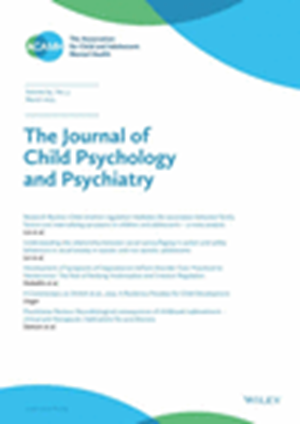An online, father‐inclusive parenting intervention for reducing child conduct problems: a randomised controlled trial of family man
IF 6.5
1区 医学
Q1 PSYCHIATRY
引用次数: 0
Abstract
BackgroundParenting interventions are effective for improving child conduct problems (CPs), but online self‐directed interventions are required to improve reach and impact. Mothers are the main users of such programmes; fathers show low participation rates despite evidence of increased efficacy when they participate.MethodsThis randomised controlled trial examined the efficacy of Family Man, a brief, self‐directed online parenting intervention for fathers and mothers of children with CPs. The intervention involves several innovative design features to maximise the engagement of fathers. Families (减少儿童行为问题的在线、父亲参与式育儿干预:家庭男子随机对照试验
背景育儿干预措施对改善儿童行为问题(CPs)很有效,但需要在线自我指导干预措施来提高覆盖率和影响力。母亲是此类项目的主要使用者;父亲的参与率较低,尽管有证据表明他们参与后效果会更好。方法这项随机对照试验研究了 "Family Man "的效果,"Family Man "是一项针对有行为问题儿童的父亲和母亲的简短、自主在线育儿干预项目。该干预措施采用了多项创新设计,以最大限度地提高父亲的参与度。寻求帮助的家庭(103 个;102 个母亲,78 个父亲)被随机分配到 Family Man 干预条件组(53 个)或为期 4 周的候补对照组(50 个)。结果重复测量方差分析/方差分析发现,在4周后的评估中,干预组家长报告的儿童抑郁症水平明显低于候补对照组。在所有次要结果中,干预组的效果也明显优于等待组。干预组的干预效果在 2 个月的随访中得以保持。结论研究结果表明,这种简短的、自我指导的在线育儿干预措施在改善儿童CPs以及一系列父母和家庭结果方面对父亲和母亲都很有效。本文还讨论了提高育儿干预的覆盖面和影响力以及增加父亲参与的意义。
本文章由计算机程序翻译,如有差异,请以英文原文为准。
求助全文
约1分钟内获得全文
求助全文
来源期刊
CiteScore
13.80
自引率
5.30%
发文量
169
审稿时长
1 months
期刊介绍:
The Journal of Child Psychology and Psychiatry (JCPP) is a highly regarded international publication that focuses on the fields of child and adolescent psychology and psychiatry. It is recognized for publishing top-tier, clinically relevant research across various disciplines related to these areas. JCPP has a broad global readership and covers a diverse range of topics, including:
Epidemiology: Studies on the prevalence and distribution of mental health issues in children and adolescents.
Diagnosis: Research on the identification and classification of childhood disorders.
Treatments: Psychotherapeutic and psychopharmacological interventions for child and adolescent mental health.
Behavior and Cognition: Studies on the behavioral and cognitive aspects of childhood disorders.
Neuroscience and Neurobiology: Research on the neural and biological underpinnings of child mental health.
Genetics: Genetic factors contributing to the development of childhood disorders.
JCPP serves as a platform for integrating empirical research, clinical studies, and high-quality reviews from diverse perspectives, theoretical viewpoints, and disciplines. This interdisciplinary approach is a key feature of the journal, as it fosters a comprehensive understanding of child and adolescent mental health.
The Journal of Child Psychology and Psychiatry is published 12 times a year and is affiliated with the Association for Child and Adolescent Mental Health (ACAMH), which supports the journal's mission to advance knowledge and practice in the field of child and adolescent mental health.

 求助内容:
求助内容: 应助结果提醒方式:
应助结果提醒方式:


